20/3/18 Tuesday of the Fifth week of Lent
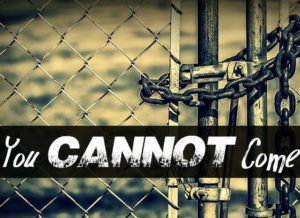 First Reading Book of Numbers 21:4-9.
First Reading Book of Numbers 21:4-9.
From Mount Hor the children of Israel set out on the Red Sea road, to by-pass the land of Edom. But with their patience worn out by the journey,
the people complained against God and Moses, “Why have you brought us up from Egypt to die in this desert, where there is no food or water? We are disgusted with this wretched food!”
In punishment the LORD sent among the people saraph serpents, which bit the people so that many of them died.
Then the people came to Moses and said, “We have sinned in complaining against the LORD and you. Pray the LORD to take the serpents from us.” So Moses prayed for the people,
and the LORD said to Moses, “Make a saraph and mount it on a pole, and if anyone who has been bitten looks at it, he will recover.”
Moses accordingly made a bronze serpent and mounted it on a pole, and whenever anyone who had been bitten by a serpent looked at the bronze serpent, he lived.
Gospel John 8:21-30.
Jesus said to the Pharisees: “I am going away and you will look for me, but you will die in your sin. Where I am going you cannot come.”
So the Jews said, “He is not going to kill himself, is he, because he said, ‘Where I am going you cannot come’?”
He said to them, “You belong to what is below, I belong to what is above. You belong to this world, but I do not belong to this world.
That is why I told you that you will die in your sins. For if you do not believe that I AM, you will die in your sins.”
So they said to him, “Who are you?” Jesus said to them, “What I told you from the beginning.
I have much to say about you in condemnation. But the one who sent me is true, and what I heard from him I tell the world.”
They did not realize that he was speaking to them of the Father.
So Jesus said (to them), “When you lift up the Son of Man, then you will realize that I AM, and that I do nothing on my own, but I say only what the Father taught me.
The one who sent me is with me. He has not left me alone, because I always do what is pleasing to him.”
19/3/18 Saint Joseph, Husband of Mary
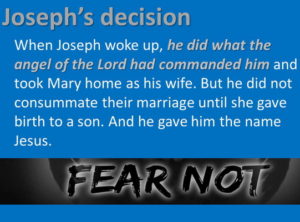 First Reading 2nd book of Samuel 7:4-5a.12-14a.16.
First Reading 2nd book of Samuel 7:4-5a.12-14a.16.
That night the LORD spoke to Nathan and said:
“Go, tell my servant David, ‘Thus says the LORD: Should you build me a house to dwell in?
And when your time comes and you rest with your ancestors, I will raise up your heir after you, sprung from your loins, and I will make his kingdom firm.
It is he who shall build a house for my name. And I will make his royal throne firm forever.
I will be a father to him, and he shall be a son to me. And if he does wrong, I will correct him with the rod of men and with human chastisements;
Your house and your kingdom shall endure forever before me; your throne shall stand firm forever.'”
Second Reading Letter to the Romans 4:13.16-18.22.
Brothers and sisters: It was not through the law that the promise was made to Abraham and his descendants that he would inherit the world, but through the righteousness that comes from faith.
For this reason, it depends on faith, so that it may be a gift, and the promise may be guaranteed to all his descendants, not to those who only adhere to the law but to those who follow the faith of Abraham, who is the father of all of us,
as it is written, “I have made you father of many nations.” He is our father in the sight of God, in whom he believed, who gives life to the dead and calls into being what does not exist.
He believed, hoping against hope, that he would become “the father of many nations,” according to what was said, “Thus shall your descendants be.”
That is why “it was credited to him as righteousness.”
Gospel Matthew 1:16.18-21.24a.
Jacob was the father of Joseph, the husband of Mary. Of her was born Jesus who is called the Christ.
Now this is how the birth of Jesus Christ came about. When his mother Mary was betrothed to Joseph, but before they lived together, she was found with child through the holy Spirit.
Joseph her husband, since he was a righteous man, yet unwilling to expose her to shame, decided to divorce her quietly.
Such was his intention when, behold, the angel of the Lord appeared to him in a dream and said, “Joseph, son of David, do not be afraid to take Mary your wife into your home. For it is through the holy Spirit that this child has been conceived in her.
She will bear a son and you are to name him Jesus, because he will save his people from their sins.”
When Joseph awoke, he did as the angel of the Lord had commanded him and took his wife into his home.
18/3/18 Fifth Sunday of Lent
 First Reading Book of Jeremiah 31:31-34.
First Reading Book of Jeremiah 31:31-34.
The days are coming, says the LORD, when I will make a new covenant with the house of Israel and the house of Judah.
It will not be like the covenant I made with their fathers the day I took them by the hand to lead them forth from the land of Egypt; for they broke my covenant and I had to show myself their master, says the LORD.
But this is the covenant which I will make with the house of Israel after those days, says the LORD. I will place my law within them, and write it upon their hearts; I will be their God, and they shall be my people.
No longer will they have need to teach their friends and kinsmen how to know the LORD. All, from least to greatest, shall know me, says the LORD, for I will forgive their evildoing and remember their sin no more.
Second Reading Letter to the Hebrews 5:7-9.
In the days when Christ Jesus was in the flesh, he offered prayers and supplications with loud cries and tears to the one who was able to save him from death, and he was heard because of his reverence.
Son though he was, he learned obedience from what he suffered;
and when he was made perfect, he became the source of eternal salvation for all who obey him.
Gospel John 12:20-33.
Now there were some Greeks among those who had come up to worship at the feast.
They came to Philip, who was from Bethsaida in Galilee, and asked him, “Sir, we would like to see Jesus.”
Philip went and told Andrew; then Andrew and Philip went and told Jesus.
Jesus answered them, “The hour has come for the Son of Man to be glorified.
Amen, amen, I say to you, unless a grain of wheat falls to the ground and dies, it remains just a grain of wheat; but if it dies, it produces much fruit.
Whoever loves his life loses it, and whoever hates his life in this world will preserve it for eternal life.
Whoever serves me must follow me, and where I am, there also will my servant be. The Father will honor whoever serves me.”
I am troubled now. Yet what should I say? ‘Father, save me from this hour’? But it was for this purpose that I came to this hour.
Father, glorify your name.” Then a voice came from heaven, “I have glorified it and will glorify it again.”
The crowd there heard it and said it was thunder; but others said, “An angel has spoken to him.”
Jesus answered and said, “This voice did not come for my sake but for yours.
Now is the time of judgment on this world; now the ruler of this world will be driven out.
And when I am lifted up from the earth, I will draw everyone to myself.”
He said this indicating the kind of death he would die.
17/3/18 Saturday of the Fourth week of Lent
 First Reading Book of Jeremiah 11:18-20.
First Reading Book of Jeremiah 11:18-20.
I knew their plot because the LORD informed me; at that time you, O LORD, showed me their doings.
Yet I, like a trusting lamb led to slaughter, had not realized that they were hatching plots against me: “Let us destroy the tree in its vigor; let us cut him off from the land of the living, so that his name will be spoken no more.”
But, you, O Lord of hosts, O just Judge, searcher of mind and heart, Let me witness the vengeance you take on them, for to you I have entrusted my cause!
Gospel John 7:40-53.
Some in the crowd who heard these words of Jesus said, “This is truly the Prophet.”
Others said, “This is the Messiah.” But others said, “The Messiah will not come from Galilee, will he?
Does not scripture say that the Messiah will be of David’s family and come from Bethlehem, the village where David lived?”
So a division occurred in the crowd because of him.
Some of them even wanted to arrest him, but no one laid hands on him.
So the guards went to the chief priests and Pharisees, who asked them, “Why did you not bring him?”
The guards answered, “Never before has anyone spoken like this one.”
So the Pharisees answered them, “Have you also been deceived?
Have any of the authorities or the Pharisees believed in him?
But this crowd, which does not know the law, is accursed.”
Nicodemus, one of their members who had come to him earlier, said to them,
Does our law condemn a person before it first hears him and finds out what he is doing?
They answered and said to him, “You are not from Galilee also, are you? Look and see that no prophet arises from Galilee.”
Then each went to his own house,
16/3/18 Friday of the Fourth week of Lent
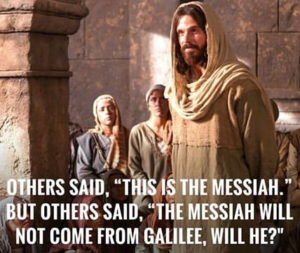 First Reading Book of Wisdom 2:1a.12-22.
First Reading Book of Wisdom 2:1a.12-22.
The wicked said among themselves, thinking not aright:
“Let us beset the just one, because he is obnoxious to us; he sets himself against our doings, Reproaches us for transgressions of the law and charges us with violations of our training.
He professes to have knowledge of God and styles himself a child of the LORD.
To us he is the censure of our thoughts; merely to see him is a hardship for us,
Because his life is not like other men’s, and different are his ways.
He judges us debased; he holds aloof from our paths as from things impure. He calls blest the destiny of the just and boasts that God is his Father.
Let us see whether his words be true; let us find out what will happen to him.
For if the just one be the son of God, he will defend him and deliver him from the hand of his foes.
With revilement and torture let us put him to the test that we may have proof of his gentleness and try his patience.
Let us condemn him to a shameful death; for according to his own words, God will take care of him.”
These were their thoughts, but they erred; for their wickedness blinded them,
And they knew not the hidden counsels of God; neither did they count on a recompense of holiness nor discern the innocent souls’ reward.
Gospel John 7:1-2.10.25-30.
Jesus moved about within Galilee; but he did not wish to travel in Judea, because the Jews were trying to kill him.
But the Jewish feast of Tabernacles was near.
But when his brothers had gone up to the feast, he himself also went up, not openly but (as it were) in secret.
So some of the inhabitants of Jerusalem said, “Is he not the one they are trying to kill?
And look, he is speaking openly and they say nothing to him. Could the authorities have realized that he is the Messiah?
But we know where he is from. When the Messiah comes, no one will know where he is from.”
So Jesus cried out in the temple area as he was teaching and said, “You know me and also know where I am from. Yet I did not come on my own, but the one who sent me, whom you do not know, is true.
I know him, because I am from him, and he sent me.”
So they tried to arrest him, but no one laid a hand upon him, because his hour had not yet come.
15/3/18 Thursday of the Fourth week of Lent
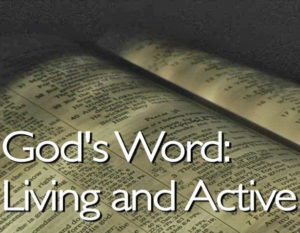 First Reading Book of Exodus 32:7-14.
First Reading Book of Exodus 32:7-14.
The LORD said to Moses, “Go down at once to your people whom you brought out of the land of Egypt, for they have become depraved.
They have soon turned aside from the way I pointed out to them, making for themselves a molten calf and worshiping it, sacrificing to it and crying out, ‘This is your God, O Israel, who brought you out of the land of Egypt!’
“I see how stiff-necked this people is,” continued the LORD to Moses.
Let me alone, then, that my wrath may blaze up against them to consume them. Then I will make of you a great nation.”
But Moses implored the LORD, his God, saying, “Why, O LORD, should your wrath blaze up against your own people, whom you brought out of the land of Egypt with such great power and with so strong a hand?
Why should the Egyptians say, ‘With evil intent he brought them out, that he might kill them in the mountains and exterminate them from the face of the earth’? Let your blazing wrath die down; relent in punishing your people.
Remember your servants Abraham, Isaac and Israel, and how you swore to them by your own self, saying, ‘I will make your descendants as numerous as the stars in the sky; and all this land that I promised, I will give your descendants as their perpetual heritage.'”
So the LORD relented in the punishment he had threatened to inflict on his people.
Gospel John 5:31-47.
Jesus said to the Jews: “If I testify on my own behalf, my testimony is not true.
But there is another who testifies on my behalf, and I know that the testimony he gives on my behalf is true.
You sent emissaries to John, and he testified to the truth.
I do not accept testimony from a human being, but I say this so that you may be saved.
He was a burning and shining lamp, and for a while you were content to rejoice in his light.
But I have testimony greater than John’s. The works that the Father gave me to accomplish, these works that I perform testify on my behalf that the Father has sent me.”
Moreover, the Father who sent me has testified on my behalf. But you have never heard his voice nor seen his form,
and you do not have his word remaining in you, because you do not believe in the one whom he has sent.
You search the scriptures, because you think you have eternal life through them; even they testify on my behalf.
But you do not want to come to me to have life.
I do not accept human praise;
moreover, I know that you do not have the love of God in you.
I came in the name of my Father, but you do not accept me; yet if another comes in his own name, you will accept him.
How can you believe, when you accept praise from one another and do not seek the praise that comes from the only God?
Do not think that I will accuse you before the Father: the one who will accuse you is Moses, in whom you have placed your hope.
For if you had believed Moses, you would have believed me, because he wrote about me.
But if you do not believe his writings, how will you believe my words?”
14/3/18 Wednesday of the Fourth week of Lent
 First Reading Book of Isaiah 49:8-15.
First Reading Book of Isaiah 49:8-15.
Thus says the LORD: In a time of favor I answer you, on the day of salvation I help you; and I have kept you and given you as a covenant to the people, To restore the land and allot the desolate heritages,
Saying to the prisoners: Come out! To those in darkness: Show yourselves! Along the ways they shall find pasture, on every bare height shall their pastures be.
They shall not hunger or thirst, nor shall the scorching wind or the sun strike them; For he who pities them leads them and guides them beside springs of water.
I will cut a road through all my mountains, and make my highways level.
See, some shall come from afar, others from the north and the west, and some from the land of Syene.
Sing out, O heavens, and rejoice, O earth, break forth into song, you mountains. For the LORD comforts his people and shows mercy to his afflicted.
But Zion said, “The LORD has forsaken me; my Lord has forgotten me.”
Can a mother forget her infant, be without tenderness for the child of her womb? Even should she forget, I will never forget you.
Gospel John 5:17-30.
Jesus answered the Jews: “My Father is at work until now, so I am at work.”
For this reason the Jews tried all the more to kill him, because he not only broke the sabbath but he also called God his own father, making himself equal to God.
Jesus answered and said to them, “Amen, amen, I say to you, a son cannot do anything on his own, but only what he sees his father doing; for what he does, his son will do also.
For the Father loves his Son and shows him everything that he himself does, and he will show him greater works than these, so that you may be amazed.
For just as the Father raises the dead and gives life, so also does the Son give life to whomever he wishes.
Nor does the Father judge anyone, but he has given all judgment to his Son,
so that all may honor the Son just as they honor the Father. Whoever does not honor the Son does not honor the Father who sent him.
Amen, amen, I say to you, whoever hears my word and believes in the one who sent me has eternal life and will not come to condemnation, but has passed from death to life.
Amen, amen, I say to you, the hour is coming and is now here when the dead will hear the voice of the Son of God, and those who hear will live.
For just as the Father has life in himself, so also he gave to his Son the possession of life in himself.
And he gave him power to exercise judgment, because he is the Son of Man.
Do not be amazed at this, because the hour is coming in which all who are in the tombs will hear his voice
and will come out, those who have done good deeds to the resurrection of life, but those who have done wicked deeds to the resurrection of condemnation.
I cannot do anything on my own; I judge as I hear, and my judgment is just, because I do not seek my own will but the will of the one who sent me.”
13/3/18 Tuesday of the Fourth week of Lent
 First Reading Book of Ezekiel 47:1-9.12.
First Reading Book of Ezekiel 47:1-9.12.
The angel brought me, Ezekiel, back to the entrance of the temple of the LORD, and I saw water flowing out from beneath the threshold of the temple toward the east, for the façade of the temple was toward the east; the water flowed down from the right side of the temple, south of the altar.
He led me outside by the north gate, and around to the outer gate facing the east, where I saw water trickling from the southern side.
Then when he had walked off to the east with a measuring cord in his hand, he measured off a thousand cubits and had me wade through the water, which was ankle-deep.
He measured off another thousand and once more had me wade through the water, which was now knee-deep. Again he measured off a thousand and had me wade; the water was up to my waist.
Once more he measured off a thousand, but there was now a river through which I could not wade; for the water had risen so high it had become a river that could not be crossed except by swimming.
He asked me, “Have you seen this, son of man?” Then he brought me to the bank of the river, where he had me sit.
Along the bank of the river I saw very many trees on both sides.
He said to me, “This water flows into the eastern district down upon the Arabah, and empties into the sea, the salt waters, which it makes fresh.
Wherever the river flows, every sort of living creature that can multiply shall live, and there shall be abundant fish, for wherever this water comes the sea shall be made fresh.
Along both banks of the river, fruit trees of every kind shall grow; their leaves shall not fade, nor their fruit fail. Every month they shall bear fresh fruit, for they shall be watered by the flow from the sanctuary. Their fruit shall serve for food, and their leaves for medicine.”
Gospel John 5:1-16.
There was a feast of the Jews, and Jesus went up to Jerusalem.
Now there is in Jerusalem at the Sheep (Gate) a pool called in Hebrew Bethesda, with five porticoes.
In these lay a large number of ill, blind, lame, and crippled.
One man was there who had been ill for thirty-eight years.
When Jesus saw him lying there and knew that he had been ill for a long time, he said to him, “Do you want to be well?”
The sick man answered him, “Sir, I have no one to put me into the pool when the water is stirred up; while I am on my way, someone else gets down there before me.”
Jesus said to him, “Rise, take up your mat, and walk.”
Immediately the man became well, took up his mat, and walked. Now that day was a sabbath.
So the Jews said to the man who was cured, “It is the sabbath, and it is not lawful for you to carry your mat.”
He answered them, “The man who made me well told me, ‘Take up your mat and walk.'”
They asked him, “Who is the man who told you, ‘Take it up and walk’?”
The man who was healed did not know who it was, for Jesus had slipped away, since there was a crowd there.
After this Jesus found him in the temple area and said to him, “Look, you are well; do not sin any more, so that nothing worse may happen to you.”
The man went and told the Jews that Jesus was the one who had made him well.
Therefore, the Jews began to persecute Jesus because he did this on a sabbath.
12/3/18 Monday of the Fourth week of Lent
 First Reading Book of Isaiah 65:17-21.
First Reading Book of Isaiah 65:17-21.
Thus says the LORD: Lo, I am about to create new heavens and a new earth; The things of the past shall not be remembered or come to mind.
Instead, there shall always be rejoicing and happiness in what I create; For I create Jerusalem to be a joy and its people to be a delight;
I will rejoice in Jerusalem and exult in my people. No longer shall the sound of weeping be heard there, or the sound of crying;
No longer shall there be in it an infant who lives but a few days, or an old man who does not round out his full lifetime; He dies a mere youth who reaches but a hundred years, and he who fails of a hundred shall be thought accursed.
They shall live in the houses they build, and eat the fruit of the vineyards they plant.
Gospel John 4:43-54.
At that time Jesus left [Samaria] for Galilee.
For Jesus himself testified that a prophet has no honor in his native place.
When he came into Galilee, the Galileans welcomed him, since they had seen all he had done in Jerusalem at the feast; for they themselves had gone to the feast.
Then he returned to Cana in Galilee, where he had made the water wine. Now there was a royal official whose son was ill in Capernaum.
When he heard that Jesus had arrived in Galilee from Judea, he went to him and asked him to come down and heal his son, who was near death.
Jesus said to him, “Unless you people see signs and wonders, you will not believe.”
The royal official said to him, “Sir, come down before my child dies.”
Jesus said to him, “You may go; your son will live.” The man believed what Jesus said to him and left.
While he was on his way back, his slaves met him and told him that his boy would live.
He asked them when he began to recover. They told him, “The fever left him yesterday, about one in the afternoon.”
The father realized that just at that time Jesus had said to him, “Your son will live,” and he and his whole household came to believe.
(Now) this was the second sign Jesus did when he came to Galilee from Judea.
11/3/18 Fourth Sunday of Lent (Laetare)
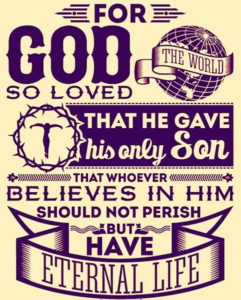 First Reading 2nd book of Chronicles 36:14-16.19-23.
First Reading 2nd book of Chronicles 36:14-16.19-23.
In those days, all the princes of Judah, the priests and the people added infidelity to infidelity, practicing all the abominations of the nations and polluting the LORD’S temple which he had consecrated in Jerusalem.
Early and often did the LORD, the God of their fathers, send his messengers to them, for he had compassion on his people and his dwelling place.
But they mocked the messengers of God, despised his warnings, and scoffed at his prophets, until the anger of the LORD against his people was so inflamed that there was no remedy.
They burnt the house of God, tore down the walls of Jerusalem, set all its palaces afire, and destroyed all its precious objects.
Those who escaped the sword he carried captive to Babylon, where they became his and his sons’ servants until the kingdom of the Persians came to power.
All this was to fulfill the word of the LORD spoken by Jeremiah: “Until the land has retrieved its lost sabbaths, during all the time it lies waste it shall have rest while seventy years are fulfilled.”
In the first year of Cyrus, king of Persia, in order to fulfill the word of the LORD spoken by Jeremiah, the LORD inspired King Cyrus of Persia to issue this proclamation throughout his kingdom, both by word of mouth and in writing:
“Thus says Cyrus, king of Persia: ‘All the kingdoms of the earth the LORD, the God of heaven, has given to me, and he has also charged me to build him a house in Jerusalem, which is in Judah. Whoever, therefore, among you belongs to any part of his people, let him go up, and may his God be with him!'”
Second Reading Letter to the Ephesians 2:4-10.
But God, who is rich in mercy, because of the great love he had for us,
even when we were dead in our transgressions, brought us to life with Christ (by grace you have been saved),
raised us up with him, and seated us with him in the heavens in Christ Jesus,
that in the ages to come he might show the immeasurable riches of his grace in his kindness to us in Christ Jesus.
For by grace you have been saved through faith, and this is not from you; it is the gift of God;
it is not from works, so no one may boast.
For we are his handiwork, created in Christ Jesus for the good works that God has prepared in advance, that we should live in them.
Gospel John 3:14-21.
Jesus said to Nicodemus, “And just as Moses lifted up the serpent in the desert, so must the Son of Man be lifted up,
so that everyone who believes in him may have eternal life.”
For God so loved the world that he gave his only Son, so that everyone who believes in him might not perish but might have eternal life.
For God did not send his Son into the world to condemn the world, but that the world might be saved through him.
Whoever believes in him will not be condemned, but whoever does not believe has already been condemned, because he has not believed in the name of the only Son of God.
And this is the verdict, that the light came into the world, but people preferred darkness to light, because their works were evil.
For everyone who does wicked things hates the light and does not come toward the light, so that his works might not be exposed.
But whoever lives the truth comes to the light, so that his works may be clearly seen as done in God.
10/3/18 Saturday of the Third week of Lent
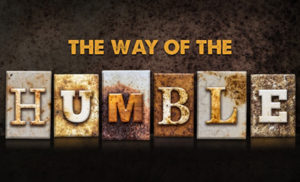 First Reading Book of Hosea 6:1-6.
First Reading Book of Hosea 6:1-6.
Come, let us return to the LORD, it is he who has rent, but he will heal us; he has struck us, but he will bind our wounds.
He will revive us after two days; on the third day he will raise us up, to live in his presence.
Let us know, let us strive to know the LORD; as certain as the dawn is his coming, and his judgment shines forth like the light of day! He will come to us like the rain, like spring rain that waters the earth.”
What can I do with you, Ephraim? What can I do with you, Judah? Your piety is like a morning cloud, like the dew that early passes away.
For this reason I smote them through the prophets, I slew them by the words of my mouth;
For it is love that I desire, not sacrifice, and knowledge of God rather than holocausts.
Jesus addressed this parable to those who were convinced of their own righteousness and despised everyone else.
“Two people went up to the temple area to pray; one was a Pharisee and the other was a tax collector.
The Pharisee took up his position and spoke this prayer to himself, ‘O God, I thank you that I am not like the rest of humanity–greedy, dishonest, adulterous–or even like this tax collector.
I fast twice a week, and I pay tithes on my whole income.’
But the tax collector stood off at a distance and would not even raise his eyes to heaven but beat his breast and prayed, ‘O God, be merciful to me a sinner.’
I tell you, the latter went home justified, not the former; for everyone who exalts himself will be humbled, and the one who humbles himself will be exalted.”
9/3/18 Friday of the Third week of Lent
 First Reading Book of Hosea 14:2-10.
First Reading Book of Hosea 14:2-10.
Thus says the LORD: Return, O Israel, to the LORD, your God; you have collapsed through your guilt.
Take with you words, and return to the LORD; Say to him, “Forgive all iniquity, and receive what is good, that we may render as offerings the bullocks from our stalls.
Assyria will not save us, nor shall we have horses to mount; We shall say no more, ‘Our god,’ to the work of our hands; for in you the orphan finds compassion.”
I will heal their defection, I will love them freely; for my wrath is turned away from them.
I will be like the dew for Israel: he shall blossom like the lily; He shall strike root like the Lebanon cedar,
and put forth his shoots. His splendor shall be like the olive tree and his fragrance like the Lebanon cedar.
Again they shall dwell in his shade and raise grain; They shall blossom like the vine, and his fame shall be like the wine of Lebanon.
Ephraim! What more has he to do with idols? I have humbled him, but I will prosper him. “I am like a verdant cypress tree”– Because of me you bear fruit!
Let him who is wise understand these things; let him who is prudent know them. Straight are the paths of the LORD, in them the just walk, but sinners stumble in them.
Gospel Mark 12:28b-34.
One of the scribes came to Jesus and asked him, “Which is the first of all the commandments?”
Jesus replied, “The first is this: ‘Hear, O Israel! The Lord our God is Lord alone!
You shall love the Lord your God with all your heart, with all your soul, with all your mind, and with all your strength.’
The second is this: ‘You shall love your neighbor as yourself.’ There is no other commandment greater than these.”
The scribe said to him, “Well said, teacher. You are right in saying, ‘He is One and there is no other than he.’
And ‘to love him with all your heart, with all your understanding, with all your strength, and to love your neighbor as yourself’ is worth more than all burnt offerings and sacrifices.”
And when Jesus saw that (he) answered with understanding, he said to him, “You are not far from the kingdom of God.” And no one dared to ask him any more questions.
8/3/18 Thursday of the Third week of Lent
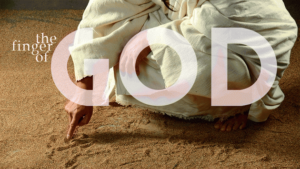 First Reading Book of Jeremiah 7:23-28.
First Reading Book of Jeremiah 7:23-28.
Thus says the LORD: This is what I commanded my people: Listen to my voice; then I will be your God and you shall be my people. Walk in all the ways that I command you, so that you may prosper.
But they obeyed not, nor did they pay heed. They walked in the hardness of their evil hearts and turned their backs, not their faces, to me.
From the day that your fathers left the land of Egypt even to this day, I have sent you untiringly all my servants the prophets.
Yet they have not obeyed me nor paid heed; they have stiffened their necks and done worse than their fathers.
When you speak all these words to them, they will not listen to you either; when you call to them, they will not answer you.
Say to them: This is the nation which does not listen to the voice of the LORD, its God, or take correction. Faithfulness has disappeared; the word itself is banished from their speech.
Gospel Luke 11:14-23.
Jesus was driving out a demon that was mute, and when the demon had gone out, the mute man spoke and the crowds were amazed.
Some of them said, “By the power of Beelzebul, the prince of demons, he drives out demons.”
Others, to test him, asked him for a sign from heaven.
But he knew their thoughts and said to them, “Every kingdom divided against itself will be laid waste and house will fall against house.
And if Satan is divided against himself, how will his kingdom stand? For you say that it is by Beelzebul that I drive out demons.
If I, then, drive out demons by Beelzebul, by whom do your own people drive them out? Therefore they will be your judges.
But if it is by the finger of God that I drive out demons, then the kingdom of God has come upon you.
When a strong man fully armed guards his palace, his possessions are safe.
But when one stronger than he attacks and overcomes him, he takes away the armor on which he relied and distributes the spoils.
Whoever is not with me is against me, and whoever does not gather with me scatters.”
7/3/18 Wednesday of the Third week of Lent
 First Reading Book of Deuteronomy 4:1.5-9.
First Reading Book of Deuteronomy 4:1.5-9.
Moses spoke to the people and said: “Now, Israel, hear the statutes and decrees which I am teaching you to observe, that you may live, and may enter in and take possession of the land which the LORD, the God of your fathers, is giving you.
Therefore, I teach you the statutes and decrees as the LORD, my God, has commanded me, that you may observe them in the land you are entering to occupy.
Observe them carefully, for thus will you give evidence of your wisdom and intelligence to the nations, who will hear of all these statutes and say, ‘This great nation is truly a wise and intelligent people.’
For what great nation is there that has gods so close to it as the LORD, our God, is to us whenever we call upon him?
Or what great nation has statutes and decrees that are as just as this whole law which I am setting before you today?”
“However, take care and be earnestly on your guard not to forget the things which your own eyes have seen, nor let them slip from your memory as long as you live, but teach them to your children and to your children’s children.”
Gospel Matthew 5:17-19.
Jesus said to his disciples: “Do not think that I have come to abolish the law or the prophets. I have come not to abolish but to fulfill.
Amen, I say to you, until heaven and earth pass away, not the smallest letter or the smallest part of a letter will pass from the law, until all things have taken place.
Therefore, whoever breaks one of the least of these commandments and teaches others to do so will be called least in the kingdom of heaven. But whoever obeys and teaches these commandments will be called greatest in the kingdom of heaven.”
6/3/18 Tuesday of the Third week of Lent
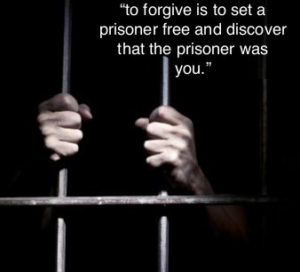 First Reading Book of Daniel 3:25.34-43.
First Reading Book of Daniel 3:25.34-43.
Azariah stood up in the fire and prayed aloud:
“For your name’s sake, do not deliver us up forever, or make void your covenant.
Do not take away your mercy from us, for the sake of Abraham, your beloved, Isaac your servant, and Israel your holy one,
To whom you promised to multiply their offspring like the stars of heaven, or the sand on the shore of the sea.
For we are reduced, O Lord, beyond any other nation, brought low everywhere in the world this day because of our sins.
We have in our day no prince, prophet, or leader, no holocaust, sacrifice, oblation, or incense, no place to offer first fruits, to find favor with you.
But with contrite heart and humble spirit let us be received;
As though it were holocausts of rams and bullocks, or thousands of fat lambs, So let our sacrifice be in your presence today as we follow you unreservedly; for those who trust in you cannot be put to shame.
And now we follow you with our whole heart, we fear you and we pray to you.
Do not let us be put to shame, but deal with us in your kindness and great mercy.
Deliver us by your wonders, and bring glory to your name, O Lord”
Gospel Matthew 18:21-35.
Peter approached Jesus and asked him, “Lord, if my brother sins against me, how often must I forgive him? As many as seven times?”
Jesus answered, “I say to you, not seven times but seventy-seven times.
That is why the kingdom of heaven may be likened to a king who decided to settle accounts with his servants.
When he began the accounting, a debtor was brought before him who owed him a huge amount.
Since he had no way of paying it back, his master ordered him to be sold, along with his wife, his children, and all his property, in payment of the debt.
At that, the servant fell down, did him homage, and said, ‘Be patient with me, and I will pay you back in full.’
Moved with compassion the master of that servant let him go and forgave him the loan.
When that servant had left, he found one of his fellow servants who owed him a much smaller amount. He seized him and started to choke him, demanding, ‘Pay back what you owe.’
Falling to his knees, his fellow servant begged him, ‘Be patient with me, and I will pay you back.’
But he refused. Instead, he had him put in prison until he paid back the debt.
Now when his fellow servants saw what had happened, they were deeply disturbed, and went to their master and reported the whole affair.
His master summoned him and said to him, ‘You wicked servant! I forgave you your entire debt because you begged me to.
Should you not have had pity on your fellow servant, as I had pity on you?’
Then in anger his master handed him over to the torturers until he should pay back the whole debt.
So will my heavenly Father do to you, unless each of you forgives his brother from his heart.”
5/3/18 Monday of the Third week of Lent
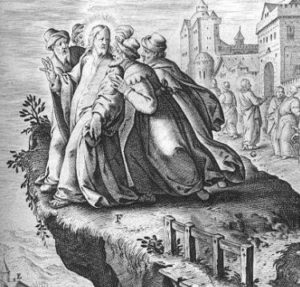 First Reading 2nd book of Kings 5:1-15a.
First Reading 2nd book of Kings 5:1-15a.
Naaman, the army commander of the king of Aram, was highly esteemed and respected by his master, for through him the LORD had brought victory to Aram. But valiant as he was, the man was a leper.
Now the Arameans had captured from the land of Israel in a raid a little girl, who became the servant of Naaman’s wife.
“If only my master would present himself to the prophet in Samaria,” she said to her mistress, “he would cure him of his leprosy.”
Naaman went and told his lord just what the slave girl from the land of Israel had said.
“Go,” said the king of Aram. “I will send along a letter to the king of Israel.” So Naaman set out, taking along ten silver talents, six thousand gold pieces, and ten festal garments.
To the king of Israel he brought the letter, which read: “With this letter I am sending my servant Naaman to you, that you may cure him of his leprosy.”
When he read the letter, the king of Israel tore his garments and exclaimed: “Am I a god with power over life and death, that this man should send someone to me to be cured of leprosy? Take note! You can see he is only looking for a quarrel with me!”
When Elisha, the man of God, heard that the king of Israel had torn his garments, he sent word to the king: “Why have you torn your garments? Let him come to me and find out that there is a prophet in Israel.”
Naaman came with his horses and chariots and stopped at the door of Elisha’s house.
The prophet sent him the message: “Go and wash seven times in the Jordan, and your flesh will heal, and you will be clean.”
But Naaman went away angry, saying, “I thought that he would surely come out and stand there to invoke the LORD his God, and would move his hand over the spot, and thus cure the leprosy.
Are not the rivers of Damascus, the Abana and the Pharpar, better than all the waters of Israel? Could I not wash in them and be cleansed?” With this, he turned about in anger and left.
But his servants came up and reasoned with him. “My father,” they said, “if the prophet had told you to do something extraordinary, would you not have done it? All the more now, since he said to you, ‘Wash and be clean,’ should you do as he said.”
So Naaman went down and plunged into the Jordan seven times at the word of the man of God. His flesh became again like the flesh of a little child, and he was clean.
He returned with his whole retinue to the man of God. On his arrival he stood before him and said, “Now I know that there is no God in all the earth, except in Israel. Please accept a gift from your servant.”
Gospel Luke 4:24-30.
Jesus said to the people in the synagogue at Nazareth: “Amen, I say to you, no prophet is accepted in his own native place.
Indeed, I tell you, there were many widows in Israel in the days of Elijah when the sky was closed for three and a half years and a severe famine spread over the entire land.
It was to none of these that Elijah was sent, but only to a widow in Zarephath in the land of Sidon.
Again, there were many lepers in Israel during the time of Elisha the prophet; yet not one of them was cleansed, but only Naaman the Syrian.”
When the people in the synagogue heard this, they were all filled with fury.
They rose up, drove him out of the town, and led him to the brow of the hill on which their town had been built, to hurl him down headlong.
But he passed through the midst of them and went away.
4/3/18 Third Sunday of Lent
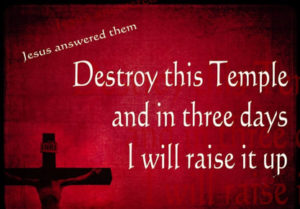 First Reading Book of Exodus 20:1-17.
First Reading Book of Exodus 20:1-17.
In those days, God delivered all these commandments :
“I, the LORD, am your God, who brought you out of the land of Egypt, that place of slavery.
You shall not have other gods besides me.
You shall not carve idols for yourselves in the shape of anything in the sky above or on the earth below or in the waters beneath the earth;
you shall not bow down before them or worship them. For I, the LORD, your God, am a jealous God, inflicting punishment for their fathers’ wickedness on the children of those who hate me, down to the third and fourth generation;
but bestowing mercy down to the thousandth generation, on the children of those who love me and keep my commandments.
“You shall not take the name of the LORD, your God, in vain. For the LORD will not leave unpunished him who takes his name in vain.
“Remember to keep holy the sabbath day.
Six days you may labor and do all your work,
but the seventh day is the sabbath of the LORD, your God. No work may be done then either by you, or your son or daughter, or your male or female slave, or your beast, or by the alien who lives with you.
In six days the LORD made the heavens and the earth, the sea and all that is in them; but on the seventh day he rested. That is why the LORD has blessed the sabbath day and made it holy.
“Honor your father and your mother, that you may have a long life in the land which the LORD, your God, is giving you.
“You shall not kill.
“You shall not commit adultery.
“You shall not steal.
“You shall not bear false witness against your neighbor.
“You shall not covet your neighbor’s house. You shall not covet your neighbor’s wife, nor his male or female slave, nor his ox or ass, nor anything else that belongs to him.”
Second Reading First Letter to the Corinthians 1:22-25.
Brothers and sisters: Jews demand signs and Greeks look for wisdom,
but we proclaim Christ crucified, a stumbling block to Jews and foolishness to Gentiles,
but to those who are called, Jews and Greeks alike, Christ the power of God and the wisdom of God.
For the foolishness of God is wiser than human wisdom, and the weakness of God is stronger than human strength.
Gospel John 2:13-25.
Since the Passover of the Jews was near, Jesus went up to Jerusalem.
He found in the temple area those who sold oxen, sheep, and doves, as well as the money-changers seated there.
He made a whip out of cords and drove them all out of the temple area, with the sheep and oxen, and spilled the coins of the money-changers and overturned their tables,
and to those who sold doves he said, “Take these out of here, and stop making my Father’s house a marketplace.”
His disciples recalled the words of scripture, “Zeal for your house will consume me.”
At this the Jews answered and said to him, “What sign can you show us for doing this?”
Jesus answered and said to them, “Destroy this temple and in three days I will raise it up.”
The Jews said, “This temple has been under construction for forty-six years, and you will raise it up in three days?”
But he was speaking about the temple of his body.
Therefore, when he was raised from the dead, his disciples remembered that he had said this, and they came to believe the scripture and the word Jesus had spoken.
While he was in Jerusalem for the feast of Passover, many began to believe in his name when they saw the signs he was doing.
But Jesus would not trust himself to them because he knew them all,
and did not need anyone to testify about human nature. He himself understood it well.
3/3/18 Saturday of the Second week of Lent
 First Reading Book of Micah 7:14-15.18-20.
First Reading Book of Micah 7:14-15.18-20.
Shepherd your people with your staff, the flock of your inheritance, That dwells apart in a woodland, in the midst of Carmel. Let them feed in Bashan and Gilead, as in the days of old;
As in the days when you came from the land of Egypt, show us wonderful signs.
Who is there like you, the God who removes guilt and pardons sin for the remnant of his inheritance; Who does not persist in anger forever, but delights rather in clemency,
And will again have compassion on us, treading underfoot our guilt? You will cast into the depths of the sea all our sins;
You will show faithfulness to Jacob, and grace to Abraham, As you have sworn to our fathers from days of old.
Gospel Luke 15:1-3.11-32.
Tax collectors and sinners were all drawing near to listen to Jesus,
but the Pharisees and scribes began to complain, saying, “This man welcomes sinners and eats with them.”
So to them he addressed this parable.
Then he said, “A man had two sons,
and the younger son said to his father, ‘Father, give me the share of your estate that should come to me.’ So the father divided the property between them.
After a few days, the younger son collected all his belongings and set off to a distant country where he squandered his inheritance on a life of dissipation.
When he had freely spent everything, a severe famine struck that country, and he found himself in dire need.
So he hired himself out to one of the local citizens who sent him to his farm to tend the swine.
And he longed to eat his fill of the pods on which the swine fed, but nobody gave him any.
Coming to his senses he thought, ‘How many of my father’s hired workers have more than enough food to eat, but here am I, dying from hunger.
I shall get up and go to my father and I shall say to him, “Father, I have sinned against heaven and against you.
I no longer deserve to be called your son; treat me as you would treat one of your hired workers.”‘
So he got up and went back to his father. While he was still a long way off, his father caught sight of him, and was filled with compassion. He ran to his son, embraced him and kissed him.
His son said to him, ‘Father, I have sinned against heaven and against you; I no longer deserve to be called your son.’
But his father ordered his servants, ‘Quickly bring the finest robe and put it on him; put a ring on his finger and sandals on his feet.
Take the fattened calf and slaughter it. Then let us celebrate with a feast,
because this son of mine was dead, and has come to life again; he was lost, and has been found.’ Then the celebration began.
Now the older son had been out in the field and, on his way back, as he neared the house, he heard the sound of music and dancing.
He called one of the servants and asked what this might mean.
The servant said to him, ‘Your brother has returned and your father has slaughtered the fattened calf because he has him back safe and sound.’
He became angry, and when he refused to enter the house, his father came out and pleaded with him.
He said to his father in reply, ‘Look, all these years I served you and not once did I disobey your orders; yet you never gave me even a young goat to feast on with my friends.
But when your son returns who swallowed up your property with prostitutes, for him you slaughter the fattened calf.’
He said to him, ‘My son, you are here with me always; everything I have is yours.
But now we must celebrate and rejoice, because your brother was dead and has come to life again; he was lost and has been found.'”
2/3/18 Friday of the Second week of Lent
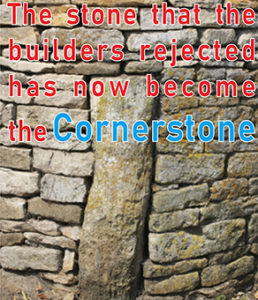 First Reading Book of Genesis 37:3-4.12-13a.17b-28.
First Reading Book of Genesis 37:3-4.12-13a.17b-28.
Israel loved Joseph best of all his sons, for he was the child of his old age; and he had made him a long tunic.
When his brothers saw that their father loved him best of all his sons, they hated him so much that they would not even greet him.
One day, when his brothers had gone to pasture their father’s flocks at Shechem,
Israel said to Joseph, “Your brothers, you know, are tending our flocks at Shechem. Get ready; I will send you to them.” “I am ready,” Joseph answered.
The man told him, “They have moved on from here; in fact, I heard them say, ‘Let us go on to Dothan.'” So Joseph went after his brothers and caught up with them in Dothan.
They noticed him from a distance, and before he came up to them, they plotted to kill him.
They said to one another: “Here comes that master dreamer!
Come on, let us kill him and throw him into one of the cisterns here; we could say that a wild beast devoured him. We shall then see what comes of his dreams.”
When Reuben heard this, he tried to save him from their hands, saying: “We must not take his life.
Instead of shedding blood,” he continued, “just throw him into that cistern there in the desert; but don’t kill him outright.” His purpose was to rescue him from their hands and restore him to his father.
So when Joseph came up to them, they stripped him of the long tunic he had on;
then they took him and threw him into the cistern, which was empty and dry.
They then sat down to their meal. Looking up, they saw a caravan of Ishmaelites coming from Gilead, their camels laden with gum, balm and resin to be taken down to Egypt.
Judah said to his brothers: “What is to be gained by killing our brother and concealing his blood?
Rather, let us sell him to these Ishmaelites, instead of doing away with him ourselves. After all, he is our brother, our own flesh.” His brothers agreed.
They sold Joseph to the Ishmaelites for twenty pieces of silver. Some Midianite traders passed by, and they pulled Joseph up out of the cistern and took him to Egypt.
Gospel Matthew 21:33-43.45-46.
Jesus said to the chief priests and the elders of the people: “Hear another parable. There was a landowner who planted a vineyard, put a hedge around it, dug a wine press in it, and built a tower. Then he leased it to tenants and went on a journey.
When vintage time drew near, he sent his servants to the tenants to obtain his produce.
But the tenants seized the servants and one they beat, another they killed, and a third they stoned.
Again he sent other servants, more numerous than the first ones, but they treated them in the same way.
Finally, he sent his son to them, thinking, ‘They will respect my son.’
But when the tenants saw the son, they said to one another, ‘This is the heir. Come, let us kill him and acquire his inheritance.’ They seized him, threw him out of the vineyard, and killed him.
What will the owner of the vineyard do to those tenants when he comes?”
They answered him, “He will put those wretched men to a wretched death and lease his vineyard to other tenants who will give him the produce at the proper times.”
Jesus said to them, “Did you never read in the scriptures: ‘The stone that the builders rejected has become the cornerstone; by the Lord has this been done, and it is wonderful in our eyes’?
Therefore, I say to you, the kingdom of God will be taken away from you and given to a people that will produce its fruit.When the chief priests and the Pharisees heard his parables, they knew that he was speaking about them. And although they were attempting to arrest him, they feared the crowds, for they regarded him as a prophet.
 First Reading Book of Jeremiah 17:5-10.
First Reading Book of Jeremiah 17:5-10.
Thus says the LORD: Cursed is the man who trusts in human beings, who seeks his strength in flesh, whose heart turns away from the LORD.
He is like a barren bush in the desert that enjoys no change of season, But stands in a lava waste, a salt and empty earth.
Blessed is the man who trusts in the LORD, whose hope is the LORD.
He is like a tree planted beside the waters that stretches out its roots to the stream: It fears not the heat when it comes, its leaves stay green; In the year of drought it shows no distress, but still bears fruit.
More tortuous than all else is the human heart, beyond remedy; who can understand it?
I, the LORD, alone probe the mind and test the heart, To reward everyone according to his ways, according to the merit of his deeds.
Gospel Luke 16:19-31.
Jesus said to the Pharisees: “There was a rich man who dressed in purple garments and fine linen and dined sumptuously each day. And lying at his door was a poor man named Lazarus, covered with sores,
who would gladly have eaten his fill of the scraps that fell from the rich man’s table. Dogs even used to come and lick his sores. When the poor man died, he was carried away by angels to the bosom of Abraham. The rich man also died and was buried, and from the netherworld, where he was in torment, he raised his eyes and saw Abraham far off and Lazarus at his side. And he cried out, ‘Father Abraham, have pity on me. Send Lazarus to dip the tip of his finger in water and cool my tongue, for I am suffering torment in these flames.’
Abraham replied, ‘My child, remember that you received what was good during your lifetime while Lazarus likewise received what was bad; but now he is comforted here, whereas you are tormented.
Moreover, between us and you a great chasm is established to prevent anyone from crossing who might wish to go from our side to yours or from your side to ours.’ He said, ‘Then I beg you, father, send him to my father’s house, for I have five brothers, so that he may warn them, lest they too come to this place of torment.’
But Abraham replied, ‘They have Moses and the prophets. Let them listen to them.’
He said, ‘Oh no, father Abraham, but if someone from the dead goes to them, they will repent.’
Then Abraham said, ‘If they will not listen to Moses and the prophets, neither will they be persuaded if someone should rise from the dead.'”
